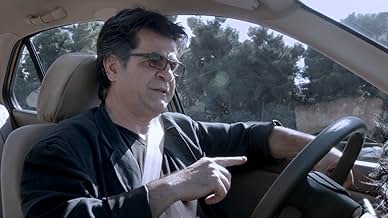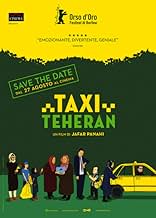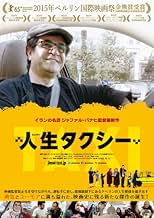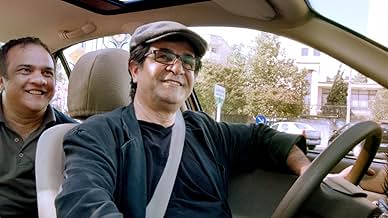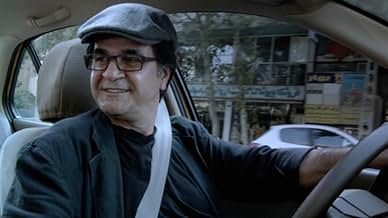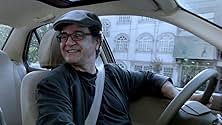Jafar Panahi foi proibido de fazer filmes pelo governo iraniano. Ele finge ser um motorista de táxi e faz um filme sobre os desafios sociais no Irã.Jafar Panahi foi proibido de fazer filmes pelo governo iraniano. Ele finge ser um motorista de táxi e faz um filme sobre os desafios sociais no Irã.Jafar Panahi foi proibido de fazer filmes pelo governo iraniano. Ele finge ser um motorista de táxi e faz um filme sobre os desafios sociais no Irã.
- Prêmios
- 8 vitórias e 8 indicações no total
Avaliações em destaque
The premise of Taxi is simple - Panahi himself, with cameras cleverly affixed throughout his vehicle, drives a taxi through the teeming streets of Iran. Throughout the day, Panahi the cabbie picks up strangers, friends and relatives, played by themselves or non- professional actors. Along the way, he makes idle conversation with them, or they chat amongst themselves - ordinary chatter that carries quite extraordinary import.
It's fascinating, thought-provoking stuff, delving deeply into ideas and questions about Iran and its politics while firmly couched in the language of the everyday. Two passengers launch into an impassioned discussion on the merits (or lack thereof) of capital punishment and syariah law. The broken body of a man is bundled into the backseat and, with what he thinks is his dying breath, he tries to circumvent laws that will prevent his sobbing wife from inheriting their home. Art and ideas are sold on the streets, the stuff of covert piracy, as the precocious Hana Saeidi, Panahi's young niece, relates to him the lessons she has learnt on how exactly to make films that will be 'screenable' in Iran.
To be honest, the final film is an amiable if somewhat rickety affair. Parts of it work better as metaphors, faltering somewhat in the execution. For instance, Hana is, literally and metaphorically, the future - both of Iran and, with her own little hand-held camera, filmmaking. But the moment when she tries to exert control over a scene she's shooting from the window of the taxi, haranguing a little boy to behave differently so that her footage will pass muster in school, feels a little too on-the-nose. In a couple of instances, it's easy to identify the issues Panahi wants to raise: in a bowl of fish or an iPad video, he finds insights about the power of superstition and the tragedy of poverty. But the scenes themselves don't always work as well, ambling when they should sprint.
Nevertheless, it's impossible to remain unmoved by the quiet power and heartbreaking passion of Taxi. This is a gem of a film: subtle, leisurely and surprisingly funny; thoughtful and deep but rarely overbearingly so. It's all the more impressive, of course, as a testament to Panahi's ongoing refusal to bend and break beneath the 20-year filmmaking ban that was slapped on him in December 2010. Since then, he's smuggled a film out of Iran on a flash drive baked into a cake, and assembled Taxi out of cam footage shot in broad daylight in Tehran. That's why, in ways both big and small, Taxi serves as a bold reminder of the bravery and strength of the human spirit.
As far as his latest film, Taxi, is concerned it's an extremely strange project--so strange I really cannot rate it. The film is completely untraditional and I've never seen anything like it. The film looks like a documentary with no real actors, though the story is in fact a story and the folks participating are not unsuspecting members of the public. In the film, Panahi plays himself and he's inexplicably driving a taxi and using a dashcam to record his passengers. The recordings are supposedly meant to illustrate some of the societal themes Iranians are struggling with and they supposedly talk without realizing they are being filmed. Among the many themes you learn about is an underground cottage industry which illegally disseminates banned Western films, how the incredibly strict Sharia Law is impacting society negatively as well as the overall climate of suspicion and secrecy. It's all incredibly strange and looks a lot like a reality television show...albeit one set in Iran.
So did I love the film? No...not really. It is very interesting and thought-provoking but it also lacks the sort of narrative or style of a film. There are no real opening or closing credits and it looks more like raw footage of Panahi and his passengers was simply smuggled out of the country. Because of this, you cannot rightfully give the film a score such as an A, B or C...it's more a piece of art that also has the ability to place the viewer into the cab along with these people to glean little snippets of their lives and their concerns. Intriguing and out this week on Netflix.
Panahi assumes the guise of a taxi driver (apparently a nod to fellow Iranian director Abbas Kiarostami's film, "Ten") and drives around a city, much like any other city, picking up various passengers throughout the day. There are moments of hilarity as Pahani deals with one situation after another, but underneath it all is a telling story of what life is like in Iran today, with particular attention to issues of censorship, state sanctioned brutality, women's rights, and of course, how this affects the arts and culture. It makes light of life in Iran and pokes fun at the powers that be, all the while recognizing that their actions have serious ramifications.
It is for the most part an engaging film, but given that it all takes place in a taxi and as such, is almost completely driven by dialog, it can drag a little. Still, for what it is, a piece of political theater, it is really excellent. If you get a chance to see it, I'd recommend it if for no other reason than to get a small feel for a country we, in the Western world, get to see so little of.
Read More Here (https://filmcurious.wordpress.com/2015/05/02/review-taxi- 2015/#more-145)
Você sabia?
- CuriosidadesShortly after the film's premiere at Berlin was announced, Jafar Panahi released an official statement in which he promised to continue making films despite the ban and said, "Nothing can prevent me from making films since when being pushed to the ultimate corners I connect with my inner-self and, in such private spaces, despite all limitations, the necessity to create becomes even more of an urge."
- Citações
Nasrin Sotoudeh: They work in a way that let us to know they are watching us.Their tactics are obvious.First, they write you up a police record. Suddenly, you are accused of being an agent for Mossad, The CIA, or MI6. Then they tack on something about your morals, your lifestyle. They make your life into a prison.Although you are released from prison, but the outside world is only a bigger prison.They make your nearest friends into your worst enemies.After that you think all you can do is either leave the country or pray to return to that hole. So i think it's better to let it go.
- ConexõesReferenced in Film Junk Podcast: Episode 547: The Revenant and Best of 2015 (2016)
Principais escolhas
- How long is Taxi?Fornecido pela Alexa
Detalhes
Bilheteria
- Faturamento bruto nos EUA e Canadá
- US$ 321.642
- Fim de semana de estreia nos EUA e Canadá
- US$ 22.531
- 4 de out. de 2015
- Faturamento bruto mundial
- US$ 3.906.227
- Tempo de duração
- 1 h 22 min(82 min)
- Cor
- Mixagem de som


